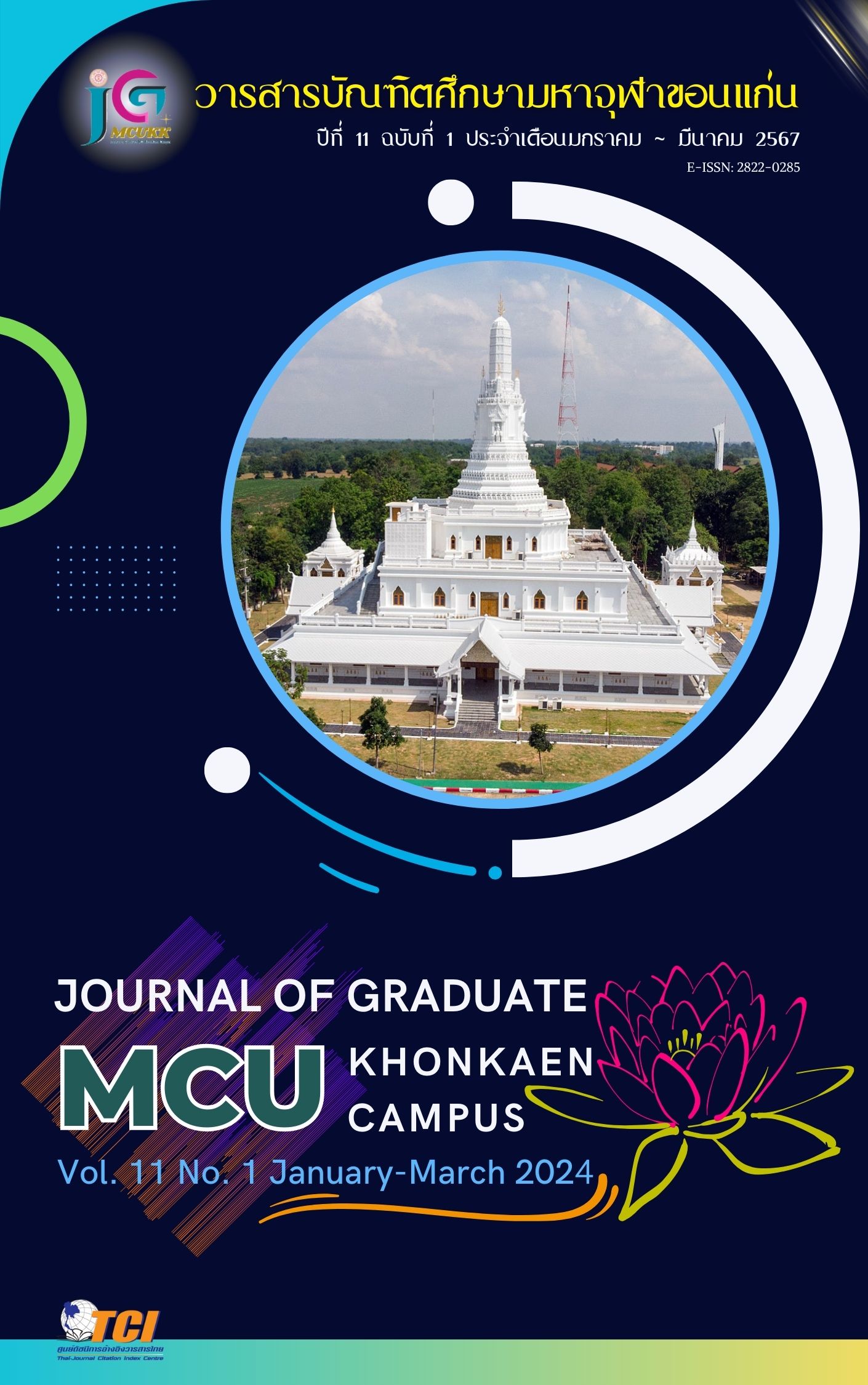Guideline for Developing Digital Citizenship of Teachers Under Nongkhai Primary Education Service Area Office 2
Main Article Content
Abstract
The objectives of this research article are 1. To study the present and desirable conditions of digital citizenship among teachers. under the Office of Nong Khai Primary Educational Service Area Office 2 and 2) Study the digital citizenship development guidelines for teachers under the Office of Nong Khai Primary Educational Service Area Office 2. This research was descriptive research. The sample group consisted of 279 school administrators and teachers. Phase 1 was a quantitative data collection using a questionnaire. Data were analyzed by statistical values, frequency, percentage, and standard deviation. and prioritize the necessary needs. Phase 2: qualitative data collection by structured interview forms The target group of 5 people was derived from the specific selection. To find ways to develop teachers' digital citizenship. Analyze the content and present it in a descriptive way.
1. The study found that the Average current condition level was at a high level The aspect with the highest average was digital security. and the desirable condition was at the highest level. The area with the highest average was digital communications.
The need for digital citizenship development guidelines Overall, it was found that digital communication was the area with the highest need. And the area with the lowest need is digital access.
2. The result of the Guidelines for Developing Digital Citizenship of Teachers under Nong Khai Primary Educational Service Area Office 2 was found that 1) teachers with self-development plans Are able to work and have skills in using technology to assist in teaching and learning management. 2) Promote effective digital communication. 3) Parent agencies must allocate sufficient budgets that are suitable for the needs of the Internet signal to meet the needs of teachers to be able to use it. 4) Promote knowledge related to intellectual property. Teacher's Digital Law Avoid copyright infringement. 5) Promote the use of digital information with caution. Be up to date with the dangers arising from digital use.
Article Details

This work is licensed under a Creative Commons Attribution-NonCommercial-NoDerivatives 4.0 International License.
References
กระทรวงศึกษาธิการ. (2563). แผนปฏิบัติการดิจิทัลเพื่อการศึกษากระทรวงศึกษาธิการ พ.ศ. 2563 -2565. สืบค้นเมื่อ 25 สิงหาคม 2565, จาก https://bict.moe.go.th/wp-content/uploads/2022/03/digital-63-65.pdf
กระทรวงเทคโนโลยีสารสนเทศและการสื่อสาร. (2565). แผนพัฒนาดิจิทัลเพื่อเศรษฐกิจและสังคม. กรุงเทพฯ: กระทรวงเทคโนโลยีสารสนเทศและการสื่อสาร.
กนกนาถ ลิขิตไพรวัลย์. (2563). กลยุทธ์การสื่อสารข้อมูลข่าวสารผ่านเฟซบุ๊กเพจในจังหวัดพิษณุโลก. (วิทยานิพนธ์ปริญญามหาบัณฑิต). พิษณุโลก: มหาวิทยาลัยนเรศวร.
ฉันทนา ปาปัดถา (2565). คุณลักษณะทางจริยธรรมและคุณลักษณะที่จำเป็นของนักศึกษาสื่อสารมวลชนในยุคดิจิทัล. วารสารศิลปะศาสตร์ราชมงคลสุวรรณภูมิ, 4(1), 69-83.
ณภัทร เรืองนภากุล. (2564). ความเป็นพลเมืองยุคดิจิทัลกับการรับมือด้านมืดออนไลน์ในวิถีปรกติงใหม่. สืบค้นเมื่อ 25 สิงหาคม 2565, จาก https://blog.cofact.org/digitalcitizen
พักตร์วิภา โพธิ์ศร. (2562). แนวทางพัฒนาบทบาทการศึกษาต่อการเสริมสร้างความเป็น พลเมืองดิจิทัลสู่ทักษะการคิดเชิงนวัตกรรม. วารสารการศึกษาและการพัฒนาสังคม, 15(2), 327-341.
พิมพ์ลักษณ์ เจริญวานิชกูร. (2564), การเปรียบเทียบการวิเคราะห์องค์ประกอบเชิงยืนยันของโมเดลการวัดความเป็นพลเมืองดิจิทัลของนักเรียนระหว่างการประมาณค่าความน่าจะเป็นสูงสุดและการวิเคราะห์แบบเบส์. วารสารการวัดประเมินผลการศึกษา, 40(107), 201–217.
พีรวิชญ์ คำเจริญ. (2563). การศึกษาพฤติกรรมการใช้สื่อดิจิทัล และทักษะการรู้เท่าทันดิจิทัลของนักเรียนชั้นประถมศึกษาตอนต้น. วารสารวิชาการนวัตกรรมสื่อสารสังคม, 8(1), 54-64.
วรรณากร พรประเสริฐ และ รักษิต สุทธิพงษ์. (2562). ความเป็นพลเมืองดิจิทัลของนิสิตนักศึกษาระดับปริญญาตรีในสถาบันอุดมศึกษาของรัฐ. (การค้นคว้าอิสระปริญญาศึกษาศาสตรมหาบัณฑิต). พะเยา: มหาวิทยาลัยพะเยา.
วรพจน์ วงศ์กิจรุ่งเรือง. (2561). คู่มือพลเมืองดิจิทัล. กรุงเทพฯ: สํานักงานส่งเสริมเศรษฐกิจดิจิทัลกระทรวงดิจิทัลเพื่อเศรษฐกิจและสังคม.
สรานนท์ อินทนนท์. (2561). การรักษาความปลอดภัยบนโลกไซเบอร์ : Cybersecurity. กรุงเทพฯ: มูลนิธิส่งเสริมสื่อเด็กและเยาวชรน (สสย.).
สุภารัตน์ จูตระกูล. (2559). ครอบครัวกับการรู้เท่าทันสื่อดิจิทัล (Digital Literacy) ของดิจิทัลเนทีฟ (Digital Natives). วารสารวิทยาการจัดการ มหาวิทยาลัยราชภัฏเชียงราย, 11(1), 131-150.
สุวิมล ว่องวาณิช และคณะ. (2558). การวิจัยและพัฒนาระบบประเมินภายในของสถานศึกษา. กรุงเทพฯ: อมรการพิมพ์.
โสภิดา วีรกุลเทวัญ. (2563). เท่าทันสื่อ : สร้างเมืองด้วยมือของทุกคน MIDL for Inclusive Cites. กรุงเทพ: สถาบันเด็กเยาวชน.
อรณี อิ่มเสถียร. (2565). การพัฒนาตัวบ่งชี้ความเป็นพลเมืองดิจิทัลของผู้บริหารสถานศึกษาสังกัดสำนักงานเขตพื้นที่ประศึกษาจังหวัดกาฬสินธุ์. (ปริญญาศึกษาศาสตร์มหาบัณฑิต). ขอนแก่น: มหาวิทยาลัยขอนแก่น.
Choi, M. (2015). Development of a Scale to Measure Digital Citizenship among Young Adults for Democratic Citizenship Education. Ohio: Ohio State University.
Choi, M., Glassman, M. & Cristol, D. (2017). What it means to be a citizen in the Internet age : Development of a reliable and valid digital citizenship scale. Computers & Education, 107, 100-112.
Netsafe. (2018). From literacy to fluency to citizenship: Digital citizenship in education. (2nd ed.). Wellington, NZ: Netsafe.
Onuma Suphattanakul. (2022). Digital Citizenship of People. Faculty of Liberal Arts, Rajamangala University of Technology Srivijaya, Thailand.
Prarichart Ruenphongphun. (2021). Developing Thai Undergraduate Online Digital Citizenship Skills (DCS) Under the New Normal. Journal of Higher Education Theory and Practice, 22(9), 16-30.
Ribble, M. (2011). Digital Citizenship in Schools. International Society for Technology in Education. Retrieved on august 26, 2022, from https://www.iste.org/docs/excerpts/DIGC12- excerpt.pdf

